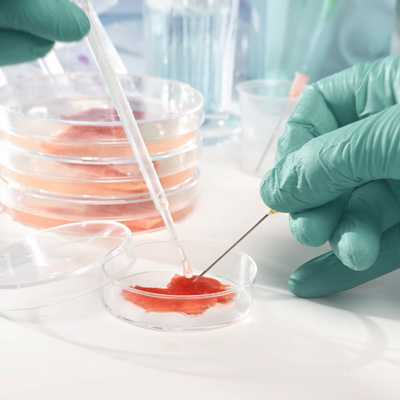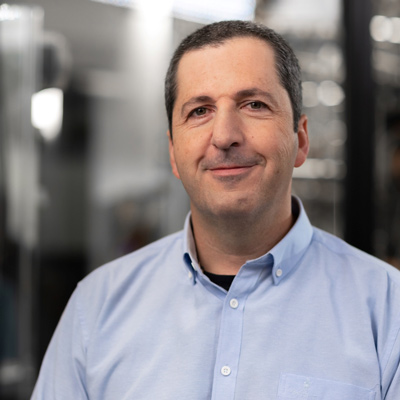

16 Jan 2023 — Israeli-based Believer Meats (formerly Future Meat Technologies), in partnership with The Hebrew University of Jerusalem, has published a study in Nature Foods revealing the former’s production methods for cost-efficient, non-GMO cultured chicken. Led by Professor Yaakov Nahmias, the founder, president and CTO of Believer Meats, the study outlines how researchers produced immortal cell lines of chicken fibroblasts using a process of “spontaneous immortalization,” as patented by the company last year.
This follows Believer recently breaking ground on a 200,000 square foot facility in the US to produce cultivated meat, the largest factory of its kind in the world.
The study’s release is notable for various reasons, although its radical transparency has surprised many. Nahmis tells FoodIngredientsFirst more.
“We strongly believe that honesty is the best policy,” says Nahmias.
“As a parent, I am eternally worried about my children’s nutrition. I want to know that what I give them to eat is safe, healthy and preferably sustainable. We wanted to ensure that everyone knows where our cell lines came from and how stable and safe they are. We wanted this efficiency to be a matter of public information, leading to a robust and sustainable production of lab-grown meat that everyone can afford.”
“Consumers want to know how the sausage is made. If we don’t provide the full scientific information they will find some crackpot on the internet that will lie to them. It is our job to make sure that the right information is available for anyone to find.”
Nahmias doubles down on his stance of absolute transparency, citing the benefits of such a move.
“Rising global food companies, like Believer Meats, must commit to full transparency. My kids want to know how their hamburgers are made, and I need to look them in the eye and explain why the food I serve them is healthy, safe and sustainable,” he continues.
“We must ensure that we, as an industry, provide all the scientific data and information to the public. If we do not rise to this challenge, consumers will search and find disinformation from charlatans online. I want to lead this conversation.”

Eliminating dangers
Nahmias says the motivation behind the production methodology is to eliminate the dangers of genetic modification.
“Genetic modifications can introduce unintended mutations that increase the risk of immunological reactions, and thus we chose to avoid them completely,” he explains.
“One concern in the field is whether the immortalization process produces cancer-forming cell lines. However, the work showed that the process developed by our group resulted in cells with normal DNA repair mechanisms and without the ability to form tumors.”
Nahmias notes the stability of Believer’s genetic line.
“One of the most surprising findings for the field is that our cell lines show remarkable genetic stability even after 1,000 generations. They have functional P53 activity that most companies knock down in their genetic modifications. It’s a very unique pathway to avoid aging.”
Increasing efficiency
The study demonstrates how spontaneous cells grown in suspension can be produced in densities of over 100 billion cells per liter, more than seventeen times the industrial standard, effectively increasing process yields from 2% to 36% weight per volume. Nahmias illustrates this level of production.
“By analogy, this would allow one to produce about 880 pounds of meat, or about a cow a month, from a vessel the size of a typical refrigerator,” he says.
With taste and texture a prime factor in drawing consumers toward alternative proteins, the process effectively differentiates fat cells, which produce the distinct aroma and flavor of chicken meat.
“We developed a highly efficient differentiation process that uses natural soy lecithin to turn fibroblasts into fat cells in under a week,” outlines Nahmias.
“Fibroblasts naturally require few growth factors for growth and thus the media is much less expensive than the one used for stem cells. The higher cell densities will allow us to be the first to reach cost parity with animal agriculture in the near future.”
“Combining the cultured cells with plant proteins produced hybrid products in which the aroma and flavor came from lab-grown cells, and the proteins were a blend of cells and plant proteins. The paper shows a significant preference for lab-grown chicken products in consumer testing.”
Nahmias is excited about the future of Believer’s technology working in tandem with its new factory.
“The company just broke ground in North Carolina for the world’s first large scale cultured meat factory. I believe it’s a watershed moment in the industry, similar to Henry Ford opening his first Model T factory,” he says.
“Nothing is going to be the same.”
Consumers drawn to transparency
In revealing its methods, Believer is tapping into growing consumer demand for transparency of food production and traceability within food chains. Innova Market Insights has noted transparency as a growing trend for the last two years, with on-pack claims boosting NPD appeal for consumers.
Industry and governmental response in this regard have primarily focused on forms of eco-labeling, with mixed results. Standardization proposals for eco-labels within the EU have met pushback, and similar efforts with seafood have confused rather than informed consumers.
As the cultivated meat and alternative protein space continue to grow, so does its NPD, with many new products arriving with product stories focused on sustainability, wellness and taste. Berlin-based Project Eaden recently netted investment to develop an ultra-realistic plant-based steak, and Israeli-based Vgarden has unveiled a tuna analog made of pea protein.
By James Davies